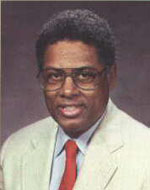|
|

Jewish World Review / June 29, 1998 / 5 Tamuz, 5758
Thomas Sowell
PRESIDENTS ARE NOT THE ONLY PEOPLE who act as if they are above the law. After California voters passed Proposition 209 outlawing racial preferences and Proposition 227 outlawing so-called "bilingual education," officials of the public schools and of the state universities have both talked openly about how they can defy or circumvent these new laws.
Public school officials are pretending that they just don't know how to "implement" the
new law or whether they can, on such short notice. Months in advance is usually
considered sufficient notice in most fields but the education establishment moves at a
glacial pace, when it moves at all.
At the university level, the brass is even brassier. Berkeley law professor Paul J. Mishkin
says: "The very big question is whether there are alternate methods to deal with the access
problem other than explicit racial preferences."
In other words: How can we have quotas without calling them quotas? The fact that the
voters have said in no uncertain terms that they don't want quotas means nothing to the
anointed.
This is the same Paul J. Mishkin who defended racial quotas 20 years ago in the landmark
Bakke case. Then he said that the outcome of this case would determine whether
minorities would have "meaningful access" and "real opportunities" to enter the learned
professions.
It is worth pausing to consider the slipperiness of these words and the sleaziness of their
evasions, if only because they demonstrate contempt for other people's rights and for their
intelligence.
What "meaningful access" boils down to is that it is not enough to allow everyone to apply
and be judged by the same standards and play by the same rules. That would be just plain
old garden-variety "access." What makes access "meaningful" is when the likes of Paul
Mishkin can decide whom to favor when they pick and choose in the back room, while
people outside in the light of day are left out of the decision or even an honest reporting of
the decision.
When quotas and preferences reigned, Berkeley administrators were able to gush to the
media about the wonderful "diversity" they had -- even though rising numbers of black
students on campus coincided with falling numbers of blacks actually getting degrees.
Moreover, even this does not tell the whole story. We will probably never know how many
of those overmatched students who did manage to survive were able to do so only by
taking drivel courses in ethnic studies and the like, instead of getting a solid education in
serious subjects somewhere else.
We are constantly being deluged with statistics about declining minority enrolment at
Berkeley and UCLA, without being told that there is rising minority enrolment in some
other state-supported universities in California.
Black students are not disappearing. They are redistributing themselves to institutions
whose normal standards they meet, without any quotas or preferences. They are far more
likely to graduate from these institutions. Being a dropout from Berkeley is no preparation
for anything.
Many people are unaware that there are two whole systems of state-supported four-year
institutions in California -- and that they are getting misleading statistics from only the top
tier of one of those systems.
The first system is called "the University of California system," and the second "the
California State University system." Los Angeles, for example, has not only UCLA but also
the California State University at Los Angeles, which is a separate institution, miles away,
with 18,000 students.
The California State University system is not chopped liver. Students at the California
Polytechnic State University at San Luis Obispo score above the national average on both
verbal and math tests, and 20 percent of them graduate with engineering degrees. A
student is far better off to graduate from Cal Poly than to flunk out of Berkeley.
But, of course, that would not allow Berkeley administrators to gush about "diversity" or
Professor Mishkin to feel good about
 Are educators above the law?
Are educators above the law?

Mishkin  Over all, there are about twice as many students in the California State University system
as in the University of California system, even though the latter gets more publicity.
Over all, there are about twice as many students in the California State University system
as in the University of California system, even though the latter gets more publicity.

6/26/98: Random Thoughts
6/24/98: An angry letter
6/22/98: Sixties sentimentalism
6/19/98:Dumbing down anti-trust
6/15/98: A changing of the guard?
6/11/98: Presidential privileges
6/8/98: Fast computers and slow antitrust
6/3/98: Can stalling backfire?
5/29/98: The insulation of the Left
5/25/98: Missing the point in the media
5/22/98: The lessons of Indonesia
5/20/98: Smart but silent
5/18/98: Israel, Clinton and character
5/14/98: Monica Lewinsky's choices
5/11/98: Random thoughts
5/7/98: Media obstruction of justice
5/4/98: Dangerous "safety"
5/1/98:
Abolish Adolescence!
4/30/98: The naked truth
4/22/98: Playing fair and square
4/19/98: Bad teachers"
4/15/98: "Clinton in Africa
"
4/13/98: "Bundling and unbundling
"
4/9/98: "Rising or falling Starr
"
4/6/98: "Was Clinton ‘vindicated'?
"
3/26/98: "Diasters -- natural and political"
3/24/98: "A pattern of behavior"
3/22/98: Innocent explanations
3/19/98: Kathleen Willey and Anita Hill
3/17/98: Search and destroy
3/12/98: Media Circus versus Justice
3/6/98: Vindication
3/3/98: Cheap Shot Time
2/26/98: The Wrong Filter
2/24/98: Trial by Media
2/20/98: Dancing Around the Realities
2/19/98: A "Do Something" War?
2/12/98: Julian Simon, combatant in a 200-year war
2/6/98: A rush to rhetoric